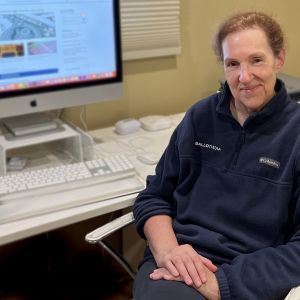How can voters regain agency in our two-party system?

These two things are true every election, regardless of the candidates or the issues: We’re told “every vote counts,” and that candidates will “work hard to earn our vote.”
But does every vote really count, or are politicians only concerned about votes from particular voters, and take the rest for granted? Perhaps they no longer need to work hard to earn our vote because their party affiliation has come to matter more to voters than anything else.
If these two basic tenets about elections are no longer true – if politicians can count on voters to cast their ballots obediently with Team Red or Team Blue no matter what – lamentably, campaigns will concentrate their efforts on a few voters in a few places. They won’t need to earn every vote everywhere.
And worse, this profound partisan polarization will mean that as voters, we’ve lost our agency– our sense of control–and become separated and defined by red and blue, elephant and donkey.
The current presidential race is a prime example of what happens when voters abandon their agency. In their “Behind the Curtain” column in Axios, Mike Allen and Jim VandeHei write that the political professionals they are talking to firmly believe that just six states – and in the end, possibly just Pennsylvania – will decide whether President Joe Biden or former President Donald Trump wins in November.
How can a national election of such importance be reduced to so few voters in so few states? Because voters have already done the work of sorting themselves into one candidate’s column or another’s. Allen and VandeHei write:
Roughly 244 million Americans will be eligible to vote. But 99.5% of us won’t be deciders: We won’t vote. Or we always vote the same way. Or we live in states virtually certain to be red or blue.
That’s a very tough pill to swallow. And democracy advocates will instinctively recoil from such a deterministic view of voters and voting.
But underlying the hard-nosed assumptions about voting behavior are even more troubling assumptions about how we got here. As Nate Silver, founder of FiveThirtyEight, writes, politics has become less about a contest between ideas – if it ever really was such a thing – and more about our “personal identity” or “which team we’re on.”
“People are trying to figure out where they fit in — who’s on their side and who isn’t. And this works in both directions: people can be attracted to a group or negatively polarized by it. People have different reasons for arguing about politics, and can derive value from a sense of social belonging and receiving reinforcement that their choices are honorable and righteous.”
Research on down-ballot voting seems to back up this idea. Writing about partisan voting trends in U.S. House elections since 2008, J. Miles Coleman notes:
Of the 435 districts in the House, the vast majority of districts have voted straight party since 2008… All told, 379 districts started in 2008 by backing the nominee of either party and have not deviated since.
Against this backdrop, it looks like our democracy isn’t nearly as vibrant as the 24-hour news cycle makes it appear, or as healthy as students of democracy know it should be.
Voters reclaiming their agency – an essential ingredient of the slow voting approach I discussed in my previous column – is a way to put our civic life on a healthier, more engaging, more meaningful track.
It takes time and effort. And courage. As Silver writes, political issues are increasingly about people “trying to figure out where they fit in — who’s on their side and who isn’t.” That’s a recipe for conformity. How, then, can we reclaim our agency without making ourselves outcasts in the neighborhood, or the butt of jokes at family gatherings?
In addition to the steps I talked about in last month’s column, let’s add one more: we need to develop what author Nir Eyal calls “the skill of the skill of the future” – the ability to be “indistractable.”
Modern politics is built around distracting people. And too often, what people are distracted from are the events and issues closest to them—both geographically and perhaps personally. We’ve seen the results of this distraction at the local level – where the policies are enacted that affect how our kids are educated, our trash collected, our streets maintained, and our neighborhoods kept safe. It’s here that voter engagement and agency is at low ebb, where it needs instead to be a steady flow
We can reclaim our vote and regain our agency. How? Make the effort to ignore, or at least minimize, the distractions of the 24-hour news cycle and permanent campaigning.
Instead, take the time we might otherwise spend scrolling “breaking news” headlines or wading through online videos to take a look at the agenda for the next school board meeting. Or look over a candidate’s replies to issue surveys like the one Ballotpedia conducts for candidates at all levels of government.
Every action we take that makes us less distracted, more informed, and more confident about our role in the democratic process enriches our lives, and our politics. Let’s get started.
The Pathfinder is a monthly column written by Leslie Graves, founder of Ballotpedia, for Preserving Democracy. Exploring topics vital to our understanding of American civics and Democracy, The Pathfinder attempts to cut through the noise of political journalism while exploring issues of vital importance to the American voter.





